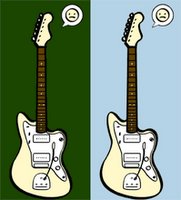
So you hear a catchy song somewhere, but don't know what it is. Could be on the radio (its possible - there's that live reggae song on 88.5 that I never catch who its by - I want to say King Cobb Steelie, but that can't be right), or in a tv advert (pray to remember some lyrics - Galaxie 500's "Instrumental" & Nissan's "Driven by Passion" was torturous for me) or in that fresh new show on the WB, except they don't have a soundtrack list on the website (first season OC was similarly painful - try googling band name "South").
So you google the lyrics - except all those lyric sites are facing copyright infringement suits now - and if you're lucky you find the band. If the band is smart it'll have a googlable name and a decent website with a couple of downloads or streaming audio.
Now you could steal the music, but the band is small and you want to do the right thing - besides they hardly have a P2P presence anyway. So now you call the local shops but they're useless. Inde labels crossing the border must be problematic. But you just want the music anyway, so you could go to iTunes and download it for a buck or the album for $10, right? But why there? If you know the artist, why not from their website? Paypal and secure download (to a universal format that would allow you to play it on both iPod and PSP). Most every decent band already allows you to buy the CD from their site. What does iTunes offer to the customer except a central repository of not everything, and standard download/purchase method? What does it offer to the artist except for visibility and access - oops, except no visibility for the inde artist. You'll never be able to browse randomly to an inde artists music on iTunes. So if you don't know what you're looking for you wouldn't find it - and wouldn't you try google before an iTunes search?
This is the same basic question Wilco, in a roundabout way, asked of its label: what good are you? The band does recording and production on its own with a small bonus in its own studio. So the label just does promotion and distribution. But never did in the way of promotion except tell the band to go on tour. Then they didn't want to bother with distribution either. Enter the interwebs, and the band found a way to distribute Yankee Hotel Foxtrot themselves.
But iTunes is just like the delinquent label in this case. Its merely a venue for distribution, but need not be the de facto online standard. There is some smart
competition (note universal mp3's with no DRM). The standard should be from the bands own site, which could become like LP cover art or music videos as the dominant visible representation of the band, giving access to purchase of goodies, CDs Ts and downloads, the bulk of the money going to the band, instead of 14 cents on the dollar through iTunes.
Further reading:
Washington PostAnalog Industries



















